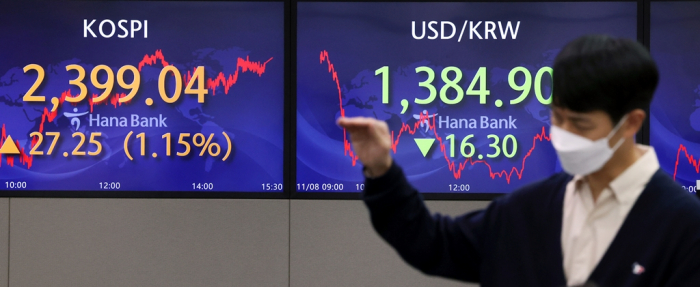Foreign exchange
Korea won hits 2-month high on US election, China hopes
Few expect the currency to reverse its weakening trend as risks including inflation remain, Fed is expected to raise rates again
By Nov 09, 2022 (Gmt+09:00)
2
Min read
Most Read
Hankook Tire buys $1 bn Hanon Systems stake from Hahn & Co.


NPS to hike risky asset purchases under simplified allocation system


UAE to invest up to $1 bn in S.Korean ventures


Osstem to buy BrazilŌĆÖs No. 3 dental implant maker Implacil


US multifamily market challenges create investment opportunities



The South Korean won on Wednesday hit a two-month high on expectations that a victory by the Republicans in the US midterm elections may slow the Federal ReserveŌĆÖs tightening moves. The currency found further support as investors predict China to ease its zero-COVID policy, helping a recovery in South KoreaŌĆÖs top export market.
The won gained up to 1.8% to 1,360.2 against the dollar, its strongest level since Sept. 2, in the local foreign exchange market in the early afternoon, on course to extend its winning streak to a fourth session.
The local unit had been weaker than the psychologically important 1,400 per dollar level since early October, tumbling to as weak as 1,444.2 on Oct. 25, its softest point since the 2008-09 global financial crisis.
Investors reduced bearish bets on the South Korean currency as the US Republican Party is more likely to beat the Democrats in the elections. The Republicans, which have been blaming the Biden administrationŌĆÖs massive spending plans for the rampant inflation in the worldŌĆÖs top economy, are expected to adjust the fiscal policy. That may allow the Fed to raise its interest rate less aggressively than before.
China is also predicted to relax its rigid zero-COVID restrictions, improving sentiment on risky assets including South Korean shares and currency, even though Beijing continues to dampen such hopes, reiterating the countryŌĆÖs commitment to eliminating COVID-19.
Foreign investors bought a combined net 1.8 trillion won ($1.3 billion) worth of Seoul stocks on the main Kospi in the first eight days of the month, according to data from the Korea Exchange.
NO END TO BEARISH TREND
The won is unlikely to reverse its downward trend, however, currency market participants said.
ŌĆ£The won may come under pressure again if inflation peaks out later than expected, geopolitical tensions widen further and the current account balance keeps deteriorating,ŌĆØ said the Korea Institute of Finance (KIF).
In the first nine months of the year, South Korea logged a current account surplus of $24.1 billion in total, less than half of the $67.4 billion a year earlier, on sluggish exports and higher imports, according to the Bank of Korea.
The institution expected the wonŌĆÖs average value for this year to weaken to the 1,360 per dollar level, the weakest since 1998 when South Korea was mired in the Asian financial crisis.
Woori BankŌĆÖs economist Min Kyung-won also said the won is predicted to remain weak, given the FedŌĆÖs policy meeting in December when the US central bank may raise its federal funds rate again.
The South Korean unit has been the worst performer among emerging Asian currencies with a loss of some 14% against the dollar so far this year.
Write to Mi-Hyun Jo at mwise@hankyung.com
Jongwoo Cheon edited this article.
More to Read
-
 EconomyFalling Korea current account surplus heightens economic woes
EconomyFalling Korea current account surplus heightens economic woesNov 08, 2022 (Gmt+09:00)
1 Min read -
 BOK may raise rates by 50 bps again on Fed, inflation
BOK may raise rates by 50 bps again on Fed, inflationNov 03, 2022 (Gmt+09:00)
2 Min read -
 Central bankBOK takes another big step hike as weak won lifts prices
Central bankBOK takes another big step hike as weak won lifts pricesOct 12, 2022 (Gmt+09:00)
3 Min read
Comment 0
LOG IN


